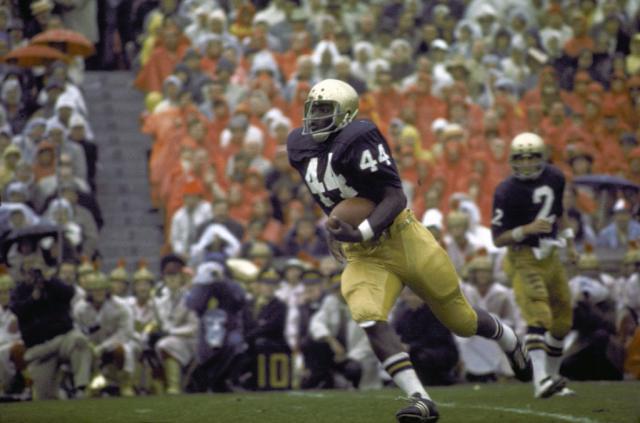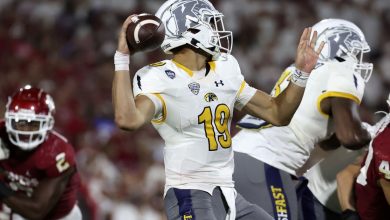Eric Penick, a key player in Notre Dame’s 1973 national title, has passed away at the age of 71.

Eric Penick, a key player in Notre Dame’s 1973 national championship victory, has passed away at the age of 71. His death marks the end of an era for a significant figure in Notre Dame football, a program that is steeped in history and tradition. Penick’s legacy, particularly for his role in the 1973 season, continues to be celebrated by fans of the Fighting Irish, and his passing has left a lasting impact on the Notre Dame community. This tribute will explore Penick’s life, his contributions to the 1973 national championship, and his enduring place in the hearts of Notre Dame fans.
Early Life and Football Beginnings
Born in Mansfield, Ohio, in 1953, Eric Penick was a natural athlete from an early age. His physical gifts made him stand out as a student-athlete, excelling in multiple sports, but football was where he truly thrived. As a high school football star, Penick demonstrated the attributes that would define his career: toughness, leadership, and a fierce determination to succeed. He played at Mansfield Senior High School, where he developed the skills that would later make him a standout at the collegiate level. His performances in high school caught the attention of college recruiters, and by the time he graduated, Penick had secured a place at one of the premier football programs in the country—Notre Dame.
The Journey to Notre Dame
When Penick committed to Notre Dame in the early 1970s, it was an exciting time for the program. Notre Dame football was experiencing a resurgence under head coach Ara Parseghian, and the team was beginning to make its mark as one of the top programs in college football. Parseghian, a legendary coach who had revitalized the Irish, had begun to assemble a talented roster of players that would set the foundation for future championships.
Penick arrived at Notre Dame with high expectations and immediately began to prove himself as a valuable member of the team. His blend of speed and power made him an ideal fit in the Irish offense, and his ability to run the football was quickly recognized by coaches and teammates alike. Throughout his early years at Notre Dame, Penick showed his versatility as both a rusher and a blocker, becoming an integral part of the Irish offense.
However, it wasn’t just Penick’s physical abilities that set him apart. His work ethic, discipline, and team-first mentality were hallmarks of his character, and these qualities made him a respected figure in the locker room. He would go on to earn the respect of his coaches, peers, and fans, but it was his role in the 1973 season that would etch his name into the annals of Notre Dame football history.
The 1973 National Championship Season
The 1973 season is one of the most celebrated in Notre Dame’s storied history, and Eric Penick’s contributions were vital to the team’s success. Under the leadership of Ara Parseghian, the Fighting Irish entered the season as one of the most talented teams in college football. The team had a strong mix of veteran players and young talent, and they were poised to make a run at the national championship.
Penick played an important role in the Irish offense throughout the season. His hard-nosed running style and ability to break tackles helped Notre Dame maintain balance on offense, especially in crucial moments. Although he was not the primary ball carrier for the team—having to share the workload with other talented backs like Julius Jones—Penick’s contributions were vital in the most critical games of the season. His ability to step up when needed and perform in key moments was a hallmark of his game.
Penick’s performance in Notre Dame’s victory over USC is perhaps one of his most memorable moments in the 1973 season. That game was a defining moment in the Irish’s quest for the national title, and Penick’s gritty performances on both offense and special teams helped secure the victory. Although he did not score in the game, Penick’s leadership and ability to move the chains during critical times were invaluable.
In the Orange Bowl, Notre Dame faced off against the Alabama Crimson Tide, another powerhouse team led by the legendary Bear Bryant. The Orange Bowl was a decisive game for the Irish, as a win would give them a shot at the national championship. Penick’s hard-running style and ability to stay patient and composed under pressure helped Notre Dame control the tempo of the game. The Irish went on to win the game, and it secured their place as the number one team in the nation.
Penick’s contributions during the 1973 season were invaluable to the Irish, but it was his ability to perform in the clutch that truly solidified his legacy as a championship-caliber player. His performance in the big moments of the season, coupled with his leadership on and off the field, made him a crucial part of the team’s success.
The National Championship
The culmination of Notre Dame’s 1973 season came when they were crowned national champions. The victory was the result of months of hard work, perseverance, and teamwork, and Penick played a significant role in that championship run. His ability to contribute in both running and blocking situations made him an essential part of the Irish offense, and his leadership on the field made him a fan favorite.
While the national championship was a collective achievement for the team, Penick’s place in history was secured by his role in the program’s success. His ability to rise to the occasion during crucial moments throughout the season proved that he was not just a talented player, but a true champion.
Life After Football
After his collegiate career came to an end, Penick’s post-football life saw him move into various roles, continuing to make a positive impact on the community. Although he did not continue playing professionally, his love for the game never waned. Penick remained involved in the Notre Dame football program and its alumni network, always eager to reconnect with former teammates and stay active within the Fighting Irish community.
Penick’s post-football life was marked by his commitment to giving back to the community, and he took on various initiatives that helped young athletes. His experience in football provided him with valuable life lessons, which he passed on to others. Whether it was through mentoring, charity work, or simply staying connected with the game he loved, Penick continued to inspire those around him long after his playing days.
Legacy in Notre Dame Football
Eric Penick’s legacy in Notre Dame football is secure, especially for fans of the 1973 national championship team. His hard work, determination, and ability to deliver when it mattered most are remembered by those who watched him play. For many, Penick is a symbol of the type of athlete that Notre Dame football prides itself on developing: a player who combines skill, intelligence, and a passion for the game.
The 1973 season, which saw Penick’s contributions front and center, remains one of the most beloved seasons in Notre Dame history. The victory that season marked a return to glory for the Fighting Irish, and Penick’s performance in pivotal moments helped lay the foundation for future success. His contributions will never be forgotten by those who remember the 1973 team and the excitement that surrounded it.
Eric Penick’s passing at the age of 71 is a moment of reflection for those who followed his career and celebrated his success on the football field. His contributions to Notre Dame’s 1973 national championship are an indelible part of the program’s history, and his legacy will continue to inspire generations of fans. While his playing days have long since passed, the impact Penick had on the Notre Dame football program will be remembered for years to come. As the Notre Dame community mourns his loss, they also celebrate the life of a true champion—both on and off the field. Rest in peace, Eric Penick. You will always be a part of the Fighting Irish family.









